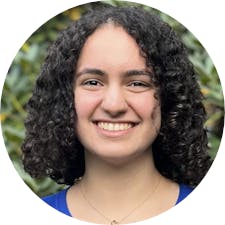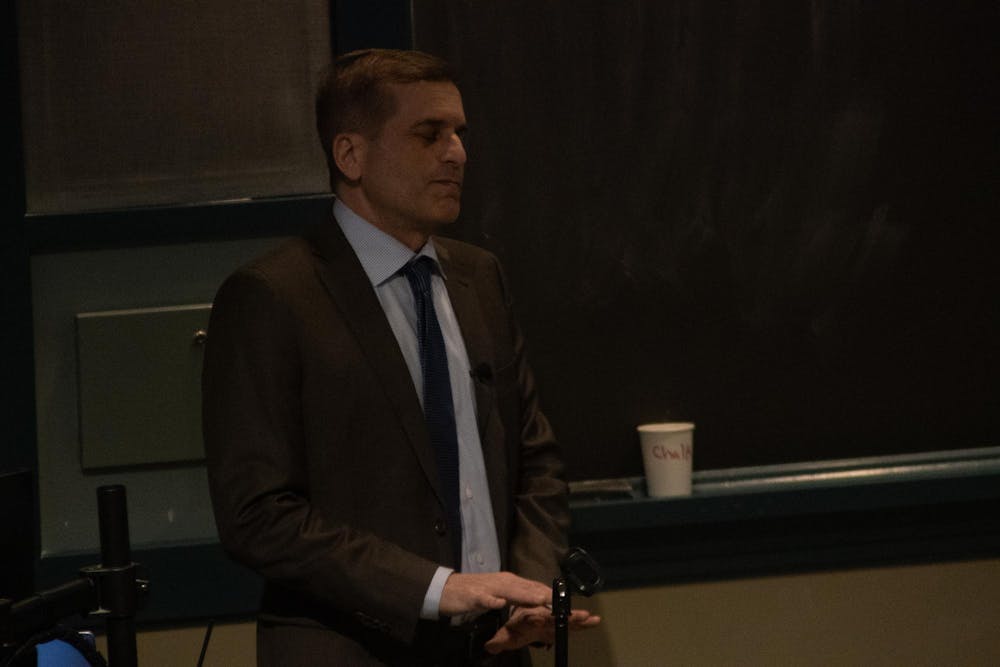Evan Mandery, an educational equity activist and critic of legacy admissions at elite universities, discussed community engagement and higher education at a Thursday talk hosted by the Class Coordinating Board and Students for Educational Equity.
Mandery, a professor at the John Jay College of Criminal Justice, argued in his most recent book, “Poison Ivy: How Elite Colleges Divide Us,” that Ivy Plus institutions and urban-suburban disparities deepen issues of socioeconomic inequality.
His talk comes a week after President Christina Paxson P’19 P’MD’20 announced that the University will reinstate standardized testing requirements for first-year applicants to the class of 2029, continue an early decision admission policy and maintain legacy preferences until further examination, The Herald previously reported.
Mandery described the decision to keep legacy preferences in admissions as “repugnant” and “unethical” in an interview with The Herald, arguing that students of color are placed at a disadvantage in the admissions process.
University Spokesperson Brian Clark wrote in an email to The Herald that “legacy status raises complicated questions about access, merit and unearned advantage, while also raising questions about benefits like lifelong affinity, philanthropic support for Brown and community.”
“This is why the committee decided it would be beneficial to pursue an ongoing examination of the many facets and considerations” surrounding legacy admissions, he wrote.
Mandery began his discussion by speaking about his own experience growing up in the Long Island suburbs among a predominantly white population. But when he began teaching at John Jay, the demographic makeup of his students contrasted with that of his upbringing.
“At CUNY, about two-thirds of our students come from families making less than $30,000 a year,” he said. According to Mandery, getting to know these students “has very deeply changed the way I look at the world.”
Mandery presented a series of statistics at his lecture showing the percentage of low-income students who attend elite colleges in the United States.
“About three percent of Brown students come from families from the lowest income quintile,” Mandery said, adding that a much larger percentage of students who attend CUNY colleges come from low-income backgrounds.
Mandery also emphasized mobility rate — the change in socioeconomic status before and after attending college — as an important statistic. He described a “stability index” he created, which measures the number of students that consistently remain in the top income quintile both before and after attending an elite university.
He added that a significant number of students at elite colleges “start out rich and remain rich,” because attending an Ivy Plus institution is “a check against significant downward mobility.”
Mandery also discussed the role of suburbs in college admissions, as wealthier families tend to move to rich suburban school districts that have access to abundant resources for their students. Those without access to such resources are put at a disadvantage, he argued.
Mandery answered questions from the audience following his presentation.
One student asked about obtainable steps for moving toward higher levels of equality in education for elite colleges.
“We’re investing in grassroots organizing,” Mandery responded. He emphasized the importance of engagement through undergraduate clubs and connecting with alumni networks to increase pressure on administrations to change their admissions policies. “You have so much more power than you realize,” he said.
According to Nick Lee ’26, SEE’s co-president, Mandery’s event was planned without knowledge of last week’s decision on admissions policies. Lee noted that Mandery’s visit was timely given his work involving “a university’s responsibility to be a center of equity and engaged learning.”
CCB Co-Chair of Diversity and Inclusion Kate Choi ’26, who was involved with planning the event, said that she had been interested in hosting Mandery for a while.
“During my time at Brown so far, the disconnect between Brown and Providence has been so evident,” she said. “Understanding institutional power, the wealth gap at Brown and other socioeconomic factors that come into play in our lives as Brown students is critical to shaping our perspective of how we affect the broader Providence community.”
Brown is rated 230th of 286 colleges in the proportion of students receiving a Pell Grant — the lowest in the Ivy League — according to a New York Times analysis.
Choi said that she had chosen not to submit test scores under Brown’s test-optional policy, and that she was frustrated that the University had discontinued the policy.
“There are a lot of emotions surrounding this topic,” she said, adding that she believed it would help shape the discussions at the event.
Both Lee and Choi emphasized that the event was intended to be apolitical while providing a space for open discussion on controversial issues.
“I hope that Evan’s talk sparks … conversation around legacy admissions,” Lee said. “We are not only students but new Providence residents, and we have a responsibility to acknowledge our role — and the University’s role — in this city.”
San Kwon ’25 was interested in Mandery’s discussion of the top income percentiles of elite college graduates. “It was very powerful to see actual statistics for that,” he added. He also noted the importance of student activism in pushing for continued change.
Camila González Vásquez ’25 was inspired by the event’s “lively and interactive” discussion. González Vásquez said she had prior knowledge of the inequities within the admissions process, but was still shocked to see concrete data and hear about Mandery’s experiences. “I think it was more impactful than I thought it was going to be,” she said.
When González Vásquez heard about the changes to admission policies, she thought it was “extremely disappointing, but not surprising.”
“It should never be understated how much we operate under this system of privilege and how much we benefit from it,” she said.

Sophia Wotman is a University news editor covering activism and affinity & identity. She is a junior from Long Island, New York concentrating in Political Science with a focus on women’s rights. She is a jazz trumpet player, and often performs on campus and around Providence.





